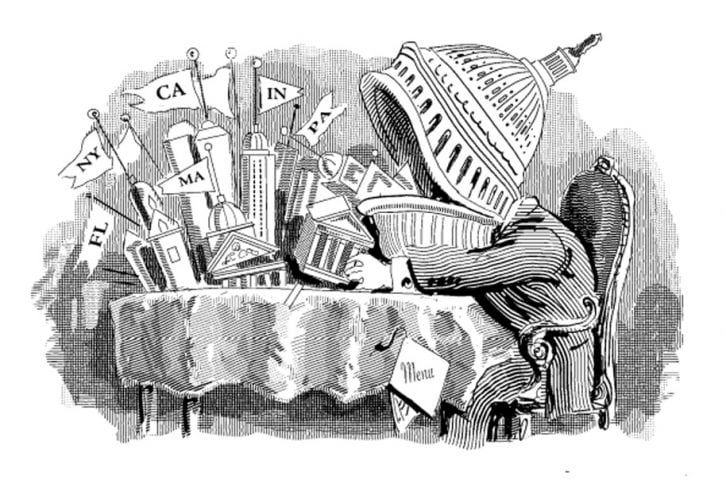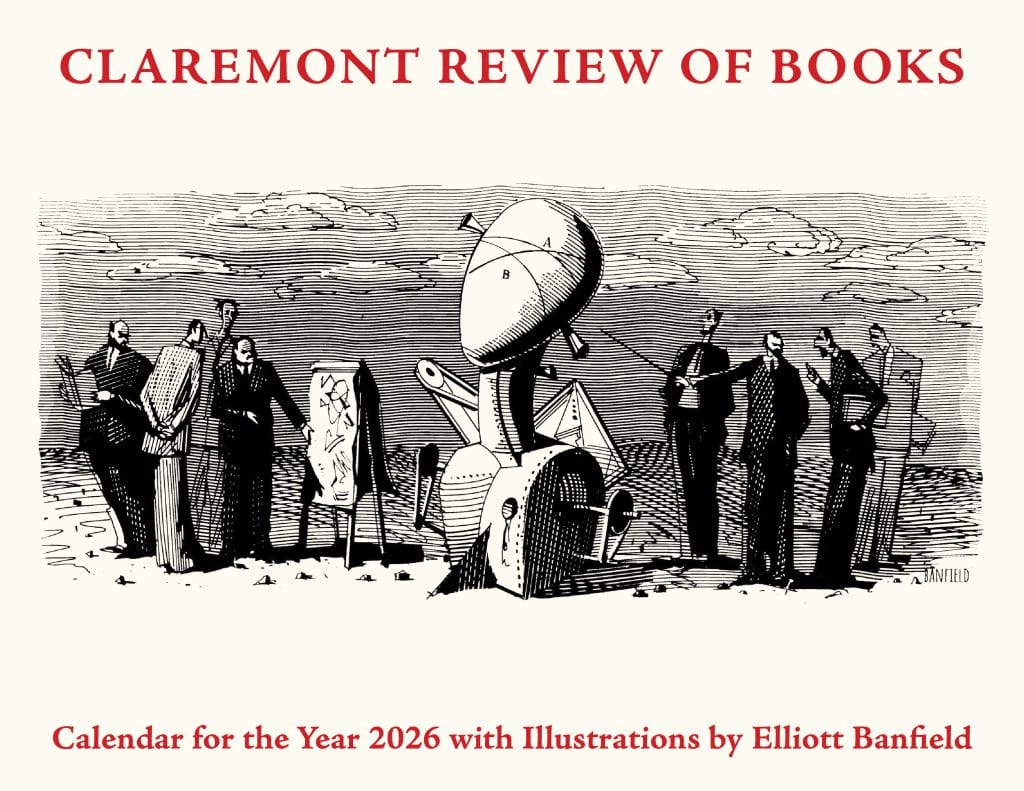Books Reviewed
A review of The Conservative Assault on the Constitution , by Erwin Chemerinsky
, by Erwin Chemerinsky
"When I use a word," Humpty Dumpty said in rather a scornful tone, "it means just what I choose it to mean—neither more nor less."
—Lewis Carroll
Through The Looking Glass
Although we have hardly returned to the original understanding of the Constitution, conservative scholarship has had a profound effect in the legal academy and, increasingly, in the courts of law. Nowadays, almost everyone is an originalist, or at least purports to be. Rare is the judge who will argue that the original meaning does not matter to constitutional interpretation. In cases such as Seminole Tribe of Florida v. Florida (1996), for example, Justice David Souter famously countered the originalist claims of the Rehnquist Court majority in a series of cases involving state sovereign immunity and the 11th Amendment with an alternative (and quite frankly more accurate) account of the Constitution's original understanding. More recently, Justice John Paul Stevens dissented from the high Court's landmark Second Amendment decision in District of Columbia v. Heller (2008), not by arguing that our society and our Constitution had evolved beyond the Second Amendment (as might have been the argument in the 1960s or '70s), but that Justice Antonin Scalia's opinion for the Court was wrong on originalist grounds. Although Stevens's account was much less persuasive than Scalia's, one has to appreciate how profoundly important it is that both sides on the Court now believe they need to ground their opinions in the original understanding of the Constitution.
A similar shift has occurred in the legal academy. A spate of recent books has tried to make the case for a living, evolving Constitution by arguing not that we have grown beyond the old constitutional norms, but that the founders themselves intended the document to be infinitely malleable, clay in the hands of a wise judiciary, to be formed to meet evolving standards of decency or to confront circumstances that the founders could not have imagined. The titles themselves convey the message: Keeping Faith with the Constitution (by Goodwin Liu, Pamela S. Karlan, and Christopher H. Schroeder, 2010); It is a Constitution We Are Expounding (by the American Constitution Society, 2009); and The Constitution in 2020 (by Jack M. Balkin and Reva B. Siegel, 2009). If you are having trouble discerning how the arguments advanced in these books differ from the original living constitutionalists' explicit repudiation of the Constitution, you are not alone. According to their authors, the "living constitution," crafted in the days of the Warren Court, was what the founders had intended all along. Apparently, the wise fathers of our nation intended nothing in our written Constitution to be binding except that nothing be binding. An interesting mix of fiction and psychoanalysis, to be sure, but hardly consistent with the evidence, as is clear to anyone who has spent even brief time toiling in the fields of the founders' writings and debates.
The most recent submission in this genre of psychological fiction, The Conservative Assault on the Constitution, comes from Erwin Chemerinsky, one of the deans of the living Constitution movement and actual Dean of the University of California, Irvine, School of Law. Chemerinsky's premise is obvious from the book's title, its cover depiction of the Constitution's "We the People" in the familiar calligraphy, and the book jacket's blurbs about the need to "reclaim the Constitution" and preserve "our constitutional birthright." His tactic is clever: each leftward evolution of the Constitution's meaning becomes a new fixed baseline of constitutional law, and any move to return to the original meaning amounts to a repudiation not of the wayward interpretation but of the Constitution itself. A nice exercise in intellectual jujitsu for the living Constitution crowd, if he can get away with it.
Happily, he doesn't even come close. Indeed, anyone looking for a nuanced academic argument in defense of the living Constitution, whether naked or dressed up in the sheep's clothing of originalism, will be sorely disappointed. The book is a partisan political diatribe, with all the spin one normally hears from politicians rather than serious scholars, complete with Orwellian doublespeak, gross hyperbole, and outright falsehood.
In Chemerinsky's view, the Constitution began in the 1930s when the Supreme Court finally acceded to the radical expansion in federal power pushed by President Franklin Roosevelt and his New Deal, and has remained a one-way ratchet ever since. The Court's recent, though relatively limited, efforts to rein in the federal leviathan by restoring the limits on government found in the original Constitution is therefore, in his mind, not an "assault" on the New Deal but on the Constitution itself. Humpty Dumpty would be proud.
Chemerinsky begins with a personal narrative about the loss the Supreme Court handed him in his challenge to the constitutionality of California's Three Strikes law, first adopted by the California legislature in March 1994 and then overwhelmingly readopted by the voters in November of that same year. His former client, Leandro Andrade, "is serving a sentence of life in prison with no possibility of parole for fifty years for stealing $153 worth of videotapes from Kmart stores in Southern California," Chemerinsky tells us in the book's opening sentence—without informing the reader until several pages later that Andrade had a string of prior convictions, including multiple residential burglaries. Instead of acknowledging that this was the very kind of repeat criminal activity the Three Strikes law aimed to prevent, Chemerinsky claims "there is no indication that California's voters realized" that the initiative "could be applied when the third strike was a minor offense such as shoplifting or possession of a small amount of drugs."
This is false. The official ballot statement, which is mailed to every single voter in California and read by a good many of them, was quite explicit: "If the person has two or more previous serious or violent felony convictions, the mandatory sentence for any new felony conviction (not just a serious or violent felony) is life imprisonment" with a long minimum term before parole eligibility. The argument against the initiative contained in the official ballot statement and repeated extensively in the campaign's advertising highlighted precisely this aspect of the proposed law: "The third strike does not have to be violent or serious—it can be any felony at all." Indeed, the example used by the opponents of the initiative is strikingly similar to Andrade's own case: "A 50-year-old man who twice stole a bicycle from a garage as a teenager, and who now writes a bad check, will get a life sentence under" the law. Contrary to Chemerinsky's assertion, the people of California were told exactly what the law would do, and by a 72% to 28% margin voted overwhelmingly to approve it.
* * *
Chemerinsky's legal arguments are just as dubious. He notes, for example, that he headed into oral argument before the Supreme Court thinking he was on "very strong ground" in the Andrade case, and ready to argue that his client's sentence was excessive. He claims that he had precedent on his side dating back a century, providing "well-established criteria" for determining that a sentence was "grossly disproportionate and thus cruel and unusual punishment" in violation of the Constitution's Eighth Amendment. But the century-old case he cites held nothing of the kind. The long-standing rule was that "the length of sentence is a matter of legislative prerogative"-just the opposite of what Chemerinsky claims. His argument against lengthy sentences for third-strike offenders did find precedent in a single 1983 case, Solem v. Helm, which overruled the long-standing rule, but was repudiated by the Court eight years later in very strong terms: "Solemwas simply wrong. The Eighth Amendment contains no proportionality guarantee," the Court held in Harmelin v. Michigan(1991) a dozen years before Chemerinsky argued Andrade's case. This is not exactly "very strong ground" for Chemerinsky's position, but his willful blindness is telling. According to his methodology, every precedent, however short-lived, that pushes the Constitution's meaning in the preferred direction, i.e., leftward, becomes the new benchmark for what the Constitution itself says, while any precedent to the contrary is simply an "assault."
Chemerinsky concludes the doleful narrative of his defeat in the case—"I literally was in tears," he says—by admitting that he was "at a loss to think of anything" that might be done to overturn such "draconian" sentences because "there is no appeal from a Supreme Court decision." This is an interesting window into the living constitutionalist psyche, which views the courts as the sole arbiter of all things good and just, so much so that no alternative even comes to mind. As anyone even vaguely familiar with California's Constitution and criminal justice system knows, there are several ways to address sentences, draconian or otherwise. The governor may issue a pardon if circumstances warrant. The people can repeal the Three Strikes law if they think it is leading to unjust sentences. Prosecutors can (and often do) find a way not to charge a crime as a third strike when the sentence would seem unduly harsh. Judges, too, can (and often do) find ways, such as reassessing a prior conviction, to avoid a third-strike sentence for truly inconsequential crimes. And of course Chemerinsky should remember the words of the sage Baretta (before Robert Blake, the actor who played the part, squandered his legacy), don't do the crime if you can't do the time.
* * *
This is just one example of the hand-wringing hyperbole and misinformation found throughout the book. President Reagan mounted "the most concerted effort in American history to remake the federal courts," we are told, with Chemerinsky adding the caveat, "in a conservative direction," so that he avoids having to compare it to FDR's outrageous Court-packing scheme. Similarly, Chemerinsky asserts that President Bush's defense of the nation against terrorism took "claims of unchecked presidential power to unprecedented heights," even though he later concedes that Bush was following the precedents set by other wartime presidents, including Abraham Lincoln, Woodrow Wilson, Franklin Roosevelt, and Harry Truman. He claims that Bush ignored the basic constitutional premise that two branches should be involved in all major governmental actions, forgetting (or worse) that Congress authorized the use of "all necessary force" against the terrorists who attacked us on 9/11, and that it was the Court that took the unprecedented step of interfering with the detention of enemy combatants in wartime. He asserts that "the phrase, ‘enemy combatant,'" is not part of either international or American law. It is, or at least the idea of it is. American law dating to the Civil War, and international law dating at least to the Hague Convention of 1907 and repeated in the Geneva Convention of 1949, spell out the distinctions between combatants (lawful and unlawful) and civilians. He claims that during the 2000 presidential election controversy, the Florida Supreme Court "ordered the immediate counting of any uncounted ballots across the state," neglecting to mention that recounts were ordered in only four heavily Democratic counties.
His false legal claims are equally numerous. "The Fourth Amendment says that searches, including government wiretapping and electronic surveillance, require a judicially approved warrant," we are told (emphasis added), even though 73 pages later he acknowledges "there must be ‘probable cause'" for police to conduct a search, and that only "generally." Contrary to his earlier claim, the Fourth Amendment's text does not "require a judicially approved warrant," but specifies that searches must be "reasonable," a standard that can be met in many circumstances without a warrant, as the courts have repeatedly confirmed. And on the issue raised by the recent controversy involving the Bush Administration's warrantless surveillance of communications between terrorists abroad and their collaborators in the United States, the Supreme Court decision cited by Chemerinsky dealt with wholly domestic investigations, specifically noting that it was expressing "no opinion as to the issues which may be involved with respect to activities of foreign powers or their agents" because of the vastly different scope of presidential powers in the latter context.
Chemerinsky heartily embraces Justice Harry Blackmun's view that the Eighth Amendment's prohibition on "cruel and unusual punishment" renders the death penalty unconstitutional in all its applications. That position, which has been rejected by the Supreme Court itself, simply cannot be squared either with the history surrounding the adoption of the Eighth Amendment or the text of the Fifth Amendment, which specifically recognizes "capital" crimes, that is, offenses that put one in "jeopardy of life." The ability to manipulate the Constitution's text to arrive at new and radically different conclusions than originally intended is the hallmark of the "living constitution" enterprise. Opposition to the enterprise may be an "assault" on the living constitution methodology, but hardly one on the Constitution, as the author claims.
* * *
These errors and many more warrant a more complete rebuttal than can be made here. But it would be wrong to ignore a particularly troubling but brutally forthright claim that Chemerinsky makes in his discussion of the Supreme Court's abortion jurisprudence. The key question in the abortion cases, he says, is "who should decide whether the fetus before viability is a human person: each woman for herself or the state legislature." I have never seen the Left's position on abortion phrased quite so starkly, but it should put to rest the myth that the "progressive" view in support of a "living Constitution" is designed to advance human dignity. That anyone, individual or legislature, gets to determine the human personhood of another human being is a notion that I had thought we had buried in the ashes of the Civil War. It bears an uncanny resemblance to the claim made by slave-owners that it was their moral prerogative to determine whether blacks should be treated as property or as human beings. If "the conservative assault on the Constitution" is an assault on that proposition, then count me among the assaulters in chief. Happily, we do not need to assault the Constitution to assault that ignominious proposition; we just need to restore the Constitution to its rightful and original meaning, as a form of government designed to secure to every American, in the words of the Declaration of Independence, the unalienable rights to life, liberty, and the pursuit of happiness given to us by our Creator.
* * *
For Correspondence on this review, click here.







